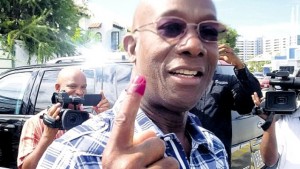
Trinidad and Tobago’s Prime Minister Dr Keith Rowley
PORT OF SPAIN, Trinidad (CMC) – Prime Minister Dr Keith Rowley on Tuesday said his administration is moving towards reviving the ailing economy of the oil rich twin-island Republic and avoid going to the International Monetary Fund (IMF).
He urged citizens “to acknowledge that we don’t have as much as we would like so there are going to be some restrictions on spending”.
But Rowley, who became head of the Trinidad and Tobago government after he led his People’s National Movement (PNM) into victory in the September 7 general election, said he does not want his administration to be classified as “an austerity government.
“Austerity is not the word, it is common sense. We are not in a restricted programme…in fact we want to ensure that we don’t end up in a situation where we are governing by …austerity, equals IMF.
“If we don’t manage our affairs properly we could end up in a situation where we don’t have options available to us. Right now we have options and the options are to behave properly and acknowledge the circumstances and choose the best of the options that we have,” Rowley told listeners to Citadel radio here.
He reminded them that countries that don’t do so “and postpone the day hoping that the next sunrise will change things on its own end up without options and they will end up with a final option which is decisions being made for you by the lender of last resort.
“We don’t want that at all,” he said, adding that the job cuts, wage freezes and other fiscal measures underscore the financial situation facing the country.
He said the message being sent to the population is simple. “These are our circumstances. For example let’s take the borrowing limit. If we did not borrow, or if we don’t set about to borrow the country would not have been in a position to pay its bills and those payments for those bills are what keeps the economy going…and also we can’t initiate any activity…to keep your economic growth going.
“The fact of the matter is that our ability to borrow was severely circumscribed because the legal limit had been reached. The Parliament authorises the government to borrow up to a certain limit. The last government had that limit, like any government has, but at the time when we came in the borrowing levels were up at the top…so if any borrowing was to take place we had to go to the Parliament and get the ceiling lifted to allow this government to borrow.”
Rowley said the question now is what to do with the money borrowed as a result of the parliamentary approval.
“First to pay bills and those bills relate to previous activities and also pay for some of the activities that we will initiate and the question is what activities will be initiated. A lot of it we will do things like infrastructural development which will bring about employment creation…and minimise the demand for foreign exchange because we have a foreign exchange restriction as well because we are not earning as much foreign exchange that we were in earlier times”.
Earlier this month, Central Bank Governor Jawala Rambarran said that Trinidad and Tobago had “officially” gone into recession and Rowley said he had no difficulty with the statement since during the election campaign his party had always indicated that the economy had become stagnant.
“Right now we are in a downturn of some kind, how far down we don’t know except looking at the prices on the revenue side but we don’t have the actual numbers and that is an unacceptable situation,” he said, noting that it is the responsibility of the government through its agencies to provide the numbers.
During the radio interview Rowley promised that the government would seek to meet its obligation to pay billions of dollars in arrears to public servants as early as possible and again urged companies not to send home workers in light of the “recession”.
He made reference to the situation at the state-owned National Gas Company (NCG) that has refrained from paying a bonus to workers as well as freezing salaries and the decision by a leading iron and steel company to send home more than 500 workers.
“NCG staff probably would have gotten bonuses in good times and they would have gotten significant pay increases…the board understanding the significant decline in NCG’s earnings took the position that we have to respond.
“Any company, if you own a company and you are faced with that kind of reduction in your revenues…and you have to report to your shareholders, you would have to tell them how you are dealing with this situation and the board saw the best way to deal with the situation is to curb the expenditure…and try to ride the ship,” Rowley said.
